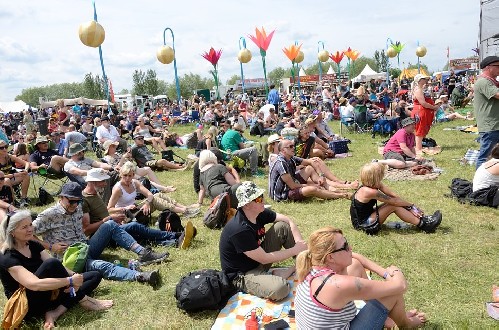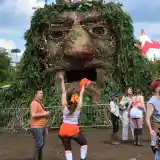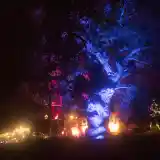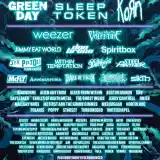
Bearded Theory 2019
Thursday 23rd to Sunday 26th May 2019Catton Hall, Walton upon Trent, Derbyshire, DE12 8LN, England MAP
adult weekend £122.50
The fields are yellow with rape. The hedgerows are white with cow parsley. It can only mean one thing – it’s time for Bearded Theory!
The Bearded Theory Spring Gathering is one of the first festivals of the season, running from the Thursday to the Sunday of the late May Bank Holiday weekend, and it starts this year in glorious spring sunshine. There are no queues [this year, makes a change], either in the car or for wristband exchange, and the walk from the parking field to the camping ground is a short and pleasant one, even burdened by camping gear. The tents are not crowded, but take care where you pitch (of which more later).
There is some sadness here this weekend – Jake Black, better known as Rev D Wayne Love of Alabama 3, was here last year, doing a DJ set. On Tuesday he died. There was a poignant tribute on the Main Stage on Friday, with the singing of You Don’t Dance to Techno Any More.
But the festival gets off to a good start. There’s not a great deal on on Thursday, and the Main Stage is not operating, but there’s certainly enough to keep us entertained. Beans on Toast plays the Woodland Stage. He’s a 38 year old kind-of-folkie. In the programme (well produced and good value at £5) it says his music is delivered with humour and a smile, but it also carries a message we could all benefit from listening to. And the programme is not wrong. At the beginning and the end of the set he is accompanied by a piano player called Ten Sheds; the middle part of the set is just him with his acoustic guitar. He sings songs against religion, against fracking, in favour of the NHS, trees, love and wanking. He’s also got a song about behaving properly at festivals, called Take Your Shit Home with You. With the piano accompaniment it’s a bit like Chas and Dave, in a good way. His songs are well-crafted, intelligent and deeply felt. He is the Billy Bragg de nos jours.
Also on Thursday, at the Something Else tent, there is a Gin Competition. Competitors bring their own flavoured gins (in plastic bottles – no glass allowed on site) to be tasted by their peers and voted on to find a winner and runners-up. Prizes are large cardboard cut-outs of gin bottles. This year there are about 50 entrants, and flavours include liquorice, coffee and chocolate, rhubarb and custard, curry, rice pudding and English breakfast. (Only one of those flavours has been made up.) All the competitors are very generous and keen for their gins to be sampled, and you don’t have to be a producer to be a consumer.
Another folkie with attitude is Rev Hammer, and he plays the Woodland Stage on Saturday. The Woodland Stage tends to be a bit folkie, and other stages have their own dominant genre, but there is absolutely no strict demarcation. All styles of music are welcome at this festival and all should be sampled. A bit like the gin. The Rev starts his set by telling us he’s got is acoustic guitar on a short lead, because he’s trying to get himself used to restricted freedom of movement. He’s from East London and he’s got great songs and great banter. His hero is Ralph McTell, he’s written a song about him, and he’d like us all to join in the chorus. It goes: Ralph McTell, Fucking hell, I love to hear you sing, I know some prefer your brother Blind Willie, But I know that you’re the king. As with Beans on Toast, the knack of mixing the comic with the serious comes naturally to him, and helps him to get across some powerful messages. He tells us about his accompanist, a mandolin player, who committed suicide. We need to stay in touch, help each other out, and if you’re a man you don’t need to be wearing a football shirt to hug another man. He finishes with an old civil war song. Top bloke.
There are plenty of bars around the site – big bars in marquees and little ones scattered around and about, including at the edge of the camping ground. There’s no restrictions on you taking your own booze, but there is reasonably priced beer to be had (£4 a pint) with lots of real ales and craft beers served by friendly and efficient staff. You pay £2 up-front for a robust plastic glass, which you then keep with you for the whole festival, although you can exchange it for a clean one whenever you want. This is to stop the wastage of single-use plastic glasses and is A Good Thing. The festival has all the right attitudes when it comes to social conscience and the environment, but there is no sense of smugness or self-satisfaction. They just get on with it.
The Wildhearts are not folkie. They play the Main Stage on Friday. Here is a list of adjectives: heavy, driving, loud, macho, chest-pounding, thrashing, throbbing, thumping. Feel free to add your own. This is good, no-shit working class music. They’re having a good time on stage and they’re not taking themselves too seriously. More guitar! More bass! More drums! Louder! There are quite a few Motorhead T shirts in the crowd. There could be a vacancy there to be filled there.
Adjectives don’t come easily in describing Mr Marcaille. He plays the Convoy Caberet [sic] on Saturday afternoon. He’s a late addition, and he isn’t mentioned in the programme, but he’s described on a board outside the venue as a metal one man band. He’s Belgian. He’s old, bald but with long hair and a huge beard. He walks on stage wearing only the tiniest, skimpiest, tightest black shorts you can imagine. He looks a bit like Father Jack and a bit like Thijs Van Leer. He spits. He plays a cello and he plays percussion with his feet, loud, and at 100mph. This is amazing. Shut your eyes and it could be really challenging, complicated prog. The next one is called Fuck off and Die. The lyrics are inaudible and the chat between numbers is incomprehensible. But you get the message, which is everything is shit and I’m angry. He spits again, and snots. He swigs beer from cans, he sweats. But he is a hugely talented musician, and an innovator. For his last number he makes deep, bassy vocal sounds using the circular breathing technique used by Mongolian throat singers and Aboriginal didgeridoo players. This is one of the highlights of the entire festival – and that’s saying something.
On a quieter, more pastoral note, there is an area of the site given over to the usual hippy festival stuff with woodland crafts and Thai massages and spiritual healing and the like. There is willow weaving and a set of stocks (or is it a pillory?) for kids to lock their parents in and throw stuff at them. There is a stall called Groovy Vinyl, which does workshops for making things like clocks and mirrors from vinyl records. At first, obviously, this sounds like vandalism, but there is a sign outside saying “No decent records harmed in this workshop”. Darren, the proprietor (who is a very nice bloke), says that the records they use are donated, and they are all pre-checked by an expert to confirm they’re shit. The odd decent ones they come across are sold on and the money donated to a community charity. Surely no-one could complain about turning Harry Seacombe into something useful. The fiver it costs to make a clock includes the working mechanism, batteries included, and a souvenir record sleeve. And you get to be able to tell the time without looking at your phone.
Pulled Apart by Horses play the Woodland Stage on Friday. They have 80s hair and a shirtless drummer. They play fast and furious indie, short songs, but they build up a wall of sound and energy. There is a hit of heaviness about them, kind of old fashioned, but none the worse for that. Reliable. What you see is what you get, and they’re not self-indulgent. Towards the end they do a cover of Iggy’s Wanna Be Your Dog and they thank us for not going to see the Oh Sees on the Main Stage, which is a nice touch of modesty.
Editors have a big sound, and they’ve got everything under control on the Main Stage. Tom Smith has authority in his voice and in his movements, with a little bit of arrogance. Bonoesque, if you like. The band have good riffs and a smooth sound, and the tom-tom drumming of Ed Lay is the perfect foil.
True Strays call themselves a delta blues band from Bristol. They Play the Maui Waui Stage early on Saturday. They are a young three-piece, and they start off with stand-up double bass, National steel guitar and drums. Proper 12 bar blues with luscious guitar breaks with lots of slide and pumping rhythm. Towards the middle of the set they get a bit more West Coast, and the National is swapped for a semi-acoustic and then a Fender. The drummer looks like a younger, handsomer Barry Chuckle. They get more up-tempo again at the end and issue instructions to do arm-swinging dances. They’ve become a ceilidh band!
The weekend weather is generally glorious, but on Sunday we wake up to light rain. This has two advantages. It keeps the early-risers in their tents, and it prevents the camping greenhouse effect from turning your tent into an oven and so driving you outside when you should still be asleep. Sleep is important.
At the edge of the camping ground, but within it, is a wooden shack called the Magic Teapot. If you have camped near to it you have made a big mistake. A small group of people gather there at the end of the day’s proceedings for sessions of what they think is singing, which is shouting, and what they think is drumming, which is banging a tom-tom at random intervals. They carry on until after it’s light and the birds have started singing, during which time they have ‘sung’ Wonderwall countless times. If you have made the mistake of pitching your tent close to the Magic Teapot you will wish that instead of packing a mallet to hammer home your tent pegs you had packed an axe to smash that miserable little shack to pieces. This is not community singing, it’s a small community of morons being arses. But their parents are probably proud of them, and they probably don’t get chance to stay up late at home. It carries on every night, including Sunday night, when people camping nearby, who have been kept awake until 4.30, have to be alert and aware to drive home on Monday morning. This is not acceptable.
But this is one small group of people affecting a relatively small group of campers. All-in-all this is a lovely festival for the nicest people you could wish to meet. For instance, somebody dropped 20 quid, and somebody else said to him, ‘Excuse me mate, you’ve just dropped 20 quid’; somebody’s hat blew off and somebody else said to her little boy, ‘Tim, run and fetch that man’s hat’. Nice people.
Steel Pulse are still going. They play the Main Stage on Sunday. The way they look, and move about on stage, must be a testament to the healing and restorative powers of ganja. They’ve still got the same sound, the same mighty dreads and the same politics. They’re not hanging on, they’re still at the top of their game. They sing songs about Zion, Hafrica, Ras Tafari ana Babylon, and you can tell they really mean it, they’re not just spouting stuff to get the audience on their side. They’re still Rocking against Racism. Ku Klux Klan is just as powerful and relevant now as it was back then, and not only on the other side of the Atlantic. At the end of the set they’re joined on stage by their kids.
After that, there’s a bit of light relief from Gaudi in the Magical Sounds Tent. He plays dancy electronica with added bagpipes, Theremin and a dancing girl. Earlier on in the same tent there was also dance music innovation from Indigo Herder. He had musicians on stage with him, with accordion, acoustic guitar, fiddle and bass, but they didn’t have much to do, he made most of the music himself with his machine, including Irish jigs with flute and Indian dances with sitar. He’s reminding people that there was dance music before dance music was invented. Earlier still there was another new celtic folk-dance outfit on at the same stage, Flutatious.
Tartiflette is a French potato dish, baked with cheese, cream and ham. It’s available at the catering stall called Cheesy Vinyl (motto – Eat cheese, feel sexy) and you can sit down inside to eat it. It’s delicious. If you need a dessert, which you won’t, their cheesecake with salted caramel is also excellent. The catering outlets are very good. There’s a top notch pasta place near the Main Stage, good hot dogs, pies and curries, and a nice little hut near the camping ground called Here Today Scone Tomorrow, where you can start your day with toast and marmalade for a quid. And all fad diets are well catered for.
Children are extremely well provided for (and also generally pretty well behaved). They have their own areas with lots of organised activities, and there’s lots for them to get involved in all through the site. The bumper balls look like great fun, and the man in charge does a good job, helping the kids send the parents careering out of control. Around the site are little stations called Busk Stops, where the kids can play their guitars or recorders and earn a few pennies to pay for a fairground ride.
Toilets are chemical. Urinals are available, as are showers. Queues for water taps are short.
Slow Readers Club are from Manchester. They’re not only slow readers, they’re bad punctuators. You need an apostrophe, lads. They play the Woodland Stage on Saturday. They have a band of loyal fans in the crowd who like to shout ‘Readers! Readers!’ between songs, which is oddly reminiscent of the loyal Gary Glitter fans who used to shout ‘Leader! Leader!’ back in the day. Their front man, Aaron Starkie, has a great voice, sometimes deep and round and other times a well-controlled falsetto. He also has a great stage presence; he looks like a heterosexual Jimmy Somerville. This band have obviously done their apprenticeship and they know how to put a show together. Great songs, powerful rhythms, well delivered.
Goldwater are from Leicester, and they’re on the Maui Waui Stage just after the Slow Readers. This is a very compact site and it’s easy and quick to get from one stage to another to get to see the maximum number of bands. Their front man, Grant, is deranged. In his brown shirt and trilby he looks like Jah Wobble, and he’s just as scary. There are also similarities with Daevid Allen and Arthur Brown. Amid thumping riffs, he tells the crowd to get down on their knees, and of course they do. You’re not going to argue with him. He climbs the lighting rig, jumps into the crowd. The band and the two backing singers are trying to follow him, but they’re not sure where he’s going. This is chaos. This is theatre. This is a damn fine gig. At the end of the set he reminds us of the name of the band. Goldwater. Like piss. In a cup.
The Sherlocks are from Sheffield, and they’re on the Main Stage on Saturday. It’s a good thing for bands to have local identity and for regional sounds to be allowed to develop. The band play short, rocky pop songs, well crafted, about ordinary lives. They wear leather jackets. It’s easy to say they’re like The Arctic Monkeys, and also to say that they’re nothing like The Human League. They are a four-piece, comprising two sets of brothers. Martin Carthy says that siblings in music have a special affinity that allows them to blossom, and there’s plenty of evidence of that here. Three of them sing, they have good songs and good voices. The lyrics are important, and we can hear them because the sound is so good. There is a clever interweaving of guitar lines and rhythms. The penultimate songs has similarities to Dear Prudence. They finish with a crowd-pleaser called Always Chasing Shadows. Making predictions is difficult, especially about the future, but it seems likely that these boys will go far.
Suede have already been a long way. Their new album is full of thoughtful, articulate, laid back, slightly proggy songs, and it’s a delight. But there’s nothing laid back about the band when they take to the Main Stage on Friday night. It’s pure Suede from the very first note, and Brett Anderson has one of the most distinctive voices in popular music. He is really fired up – skipping around, climbing on the furniture, swinging the mic, pleading for more audience response. He’s torn his shirt. The music is powerful, but melodic. The lyrics are clever but real. They play all the favourites. The sound is powerful. It’s pure Suede to the last note. Part way through the set a barn owl flies over, picked out by the stage-lights, ghostly white.
There is a long list of other acts that deserve an honourable mention. They include:
Stevie Simpson, who sang Americana in the Something Else tent on Thursday, getting us in the mood for the festival to come. He’s an English Willie Nelson.
Slack Mallard a young four-piece with mandolins, banjo, cow bell and cajón, played political folk about economics, war, drugs and dementia.
Mad Dog McCrea played Dubliners-style diddly-dee music to great effect on the Main Stage on Friday.
Hollie Cook. Lovers’ rock with a sweet, delicate voice and clever keyboard effects.
Malka, in the Maui Waui. Fragile pop tunes reminiscent of the Bobby McGees and Katy Bowser. Glittery gold hats.
51st State played the Convoy Caberet. Like the Sleaford Mods in dreads and combats.
Muddy Summers and the Dirty Field Whores. Who would have guessed that they were a festival band? Feminist folk with serious songs about gender equality, abortion and boobs (‘cheer if you like boobs!’).
The Ferrets played the Something Else tent. ‘Take your axe and your matches and bring the system down’. (No, just go to the Magic Teapot.)
The Mahones. From Toronto, bashing out Irish folk, Pogues style, since St Patrick’s Day 1990.
The Blinders, a power trio from Doncaster. The guitarist wore make up like Nick Cave and the bass player looked like a young Nick Cave. Dark songs. Thoughtful songs. Rocking finish.
Well, that’s it, then.
It was the European elections on Thursday and the vote count on Sunday, but we’ve been able to spend the entire long weekend not worrying that the country, and indeed the world, is going to shit. And by setting off reasonably early, we can be back in time to watch the Championship play-offs.
Looking forward to next year.
Latest Updates
 Bearded Theory 2025
Bearded Theory 2025festival details
 Bearded Theory 2025
Bearded Theory 2025line-ups & rumours
 Bearded Theory Festival 2024 - The Review
Bearded Theory Festival 2024 - The ReviewThe Weather comes home to Roost
 Bearded Theory 2024
Bearded Theory 2024photo galleries
 Bearded Theory 2024
Bearded Theory 2024festival details





